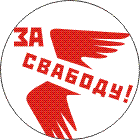The official Minsk had to accept yet one more demand of the West. After the fourth attempt an organization of Alyaksandr Milinkevich, a former presidential hopeful and a fierce opponent of Alyaksandr Lukashenka, received a legal status. Thus, the Movement for Freedom, having its goals as defending human rights and civil activism, became the first significant opposition structure registered in Belarus in the last 8 years.
Words of welcome…
Members of the Movement do not hide their pleasure and optimism. In an interview to Radio Liberty, Yury Hubarevich, the vice-chair of the Movement, noted, “Our registration demonstrates certain changes in a way the regime considers civil society in Belarus. We would really like to view the fact of Movement’s registration as not something exemplary from a common practice of non-registering. We would like to see other independent and democratic organization receive their registrations in near future. Many of them already have their documents ready and formal procedures in line with the Ministry of Justice requirements.”
The movement leader Alyaksandr Milinkevich thinks that the democratic opposition can start cooperation with the government in these new conditions in order to protect Belarus’ independence. While addressing students of the Kastus Kalinouski program in Bialystok, a program designed for students expelled from Belarusian universities because of their political activism, he stated, “We and the government have a common interest in preserving the sovereignty of Belarus. And this is where we can cooperate. There is no need to be afraid of this. It is not a cooperation to support the dictatorship. But this cooperation is rather for not letting Belarus to fall on her knees, to collapse.”
opposition can start cooperation with the government in these new conditions in order to protect Belarus’ independence. While addressing students of the Kastus Kalinouski program in Bialystok, a program designed for students expelled from Belarusian universities because of their political activism, he stated, “We and the government have a common interest in preserving the sovereignty of Belarus. And this is where we can cooperate. There is no need to be afraid of this. It is not a cooperation to support the dictatorship. But this cooperation is rather for not letting Belarus to fall on her knees, to collapse.”
The Movement for Freedom legalisation was greeted by prominent politicians and human rights activists across Europe. Javier Solana, the High Representative for the Common Foreign and Security Policy of the European Union, stressed that “The issue of legal rights of civil society organisations has played an important role in the ongoing dialogue between the European Union and the Belarusian authorities. The release of the last internationally recognised political prisoners last August has led to a new phase in this dialogue. The decision on the For Freedom movement is an important step, which will further support positive developments in the relationship between the European Union and Belarus.” Benita Ferrero-Waldner, the European Commissioner for External Relations and European Neighbourhood Policy, called Movement’s registration “A step in the right direction to respect rights of NGO’s and the freedom of assembly.”
… and caution.
 Political scientist Uladzimir Rouda thinks that official acceptance of the Movement for Freedom is typical of behaviour the regime demonstrates recently. “At first it means improvement in relations with the West, the dialogue, etc. I reckon, undoubtedly, this is the influence of [Uladzimir] Makei, the new head of presidential administration. But it is not such a big concession. Whether there is one civil organization more or less will not affect status quo much.”
Political scientist Uladzimir Rouda thinks that official acceptance of the Movement for Freedom is typical of behaviour the regime demonstrates recently. “At first it means improvement in relations with the West, the dialogue, etc. I reckon, undoubtedly, this is the influence of [Uladzimir] Makei, the new head of presidential administration. But it is not such a big concession. Whether there is one civil organization more or less will not affect status quo much.”
There are plenty of reasons for restrained reactions. On the day of registration in Pinsk local KGB tried to persuade a movement activist to “work” for them. According to the website www.milinkevich.org, secret services were motivated to “have no Movement for Freedom activists in Pinsk.” Not long before, on 12 December, law enforcement officers visited Syarhej Trafimchyk, an activist from the town of Byarozauka. He considers it an attempt to intimidate him and his family.
The Movement’s registration does not address all pressing issues in Belarus. One of them is the future of other unregistered NGO’s. For the seventh time in a row the Mahilyou Independent Union of Radioelectronic Industry was denied registration. In Minsk, the Human Rights Centre is on the verge of shutting down. The organization is not able to pay its office rent, which rather abruptly increased tenfold. Raisa Mikhailouskaya, the Human Rights Centre chairwoman, remarks, “The regime’s bows towards the European Union cause cautious optimism amongst Western diplomats in forecasting possible relations with the official Minsk. However, the so-called liberalisation, if you look at it more carefully, happens to be a farce. Hundreds of organisations are facing total shutdown as we speak.”
Documents:





